This post may contain affiliate links. Please read our disclosure policy.
Everything you need to know about how to roast chestnuts, how to season and store them – for a quick, easy, and delicious festive treat! These easy-peel roasted chestnuts are nutty, creamy, tender, slightly sweet, and about to become your new favorite Christmas snack!
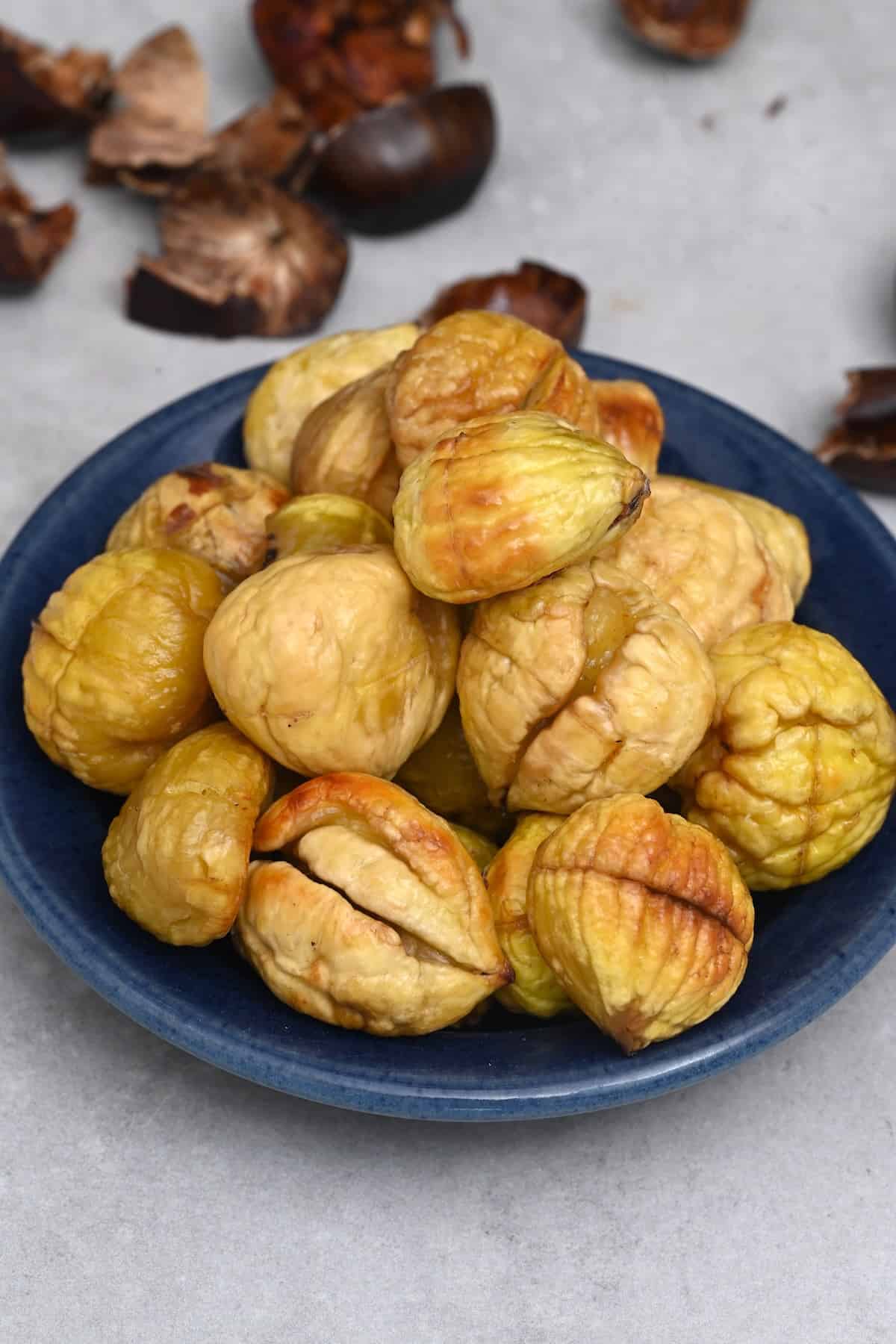
Whenever I think of roasted chestnuts, I think of being wrapped up in a coat and scarf while I meander Christmas markets, nibbling on the tender treat. However, now I’ve recreated that magic in the warmth of my home with this method for roasting chestnuts in the oven (or an air fryer).
With chestnuts being readily available in most major supermarkets in the lead-up to Christmas, this has become one of my favorite annual treats. The process is surprisingly simple, you can enjoy them whenever you like (and impress guests with them, too), and you’ll even save some money. And, while roasting them over an open fire is excellent, if you can do so, almost anyone can enjoy this method for cooking chestnuts in the oven.
Want to save this recipe?
Table of Contents
What Do Roasted Chestnuts Taste Like
Though chestnuts are crunchy and bitter when raw, their flavor and texture are transformed once roasted, becoming tender (and slightly spongy), sweet, and buttery, with a subtle nutty flavor, yet most often compared to sweet potato.
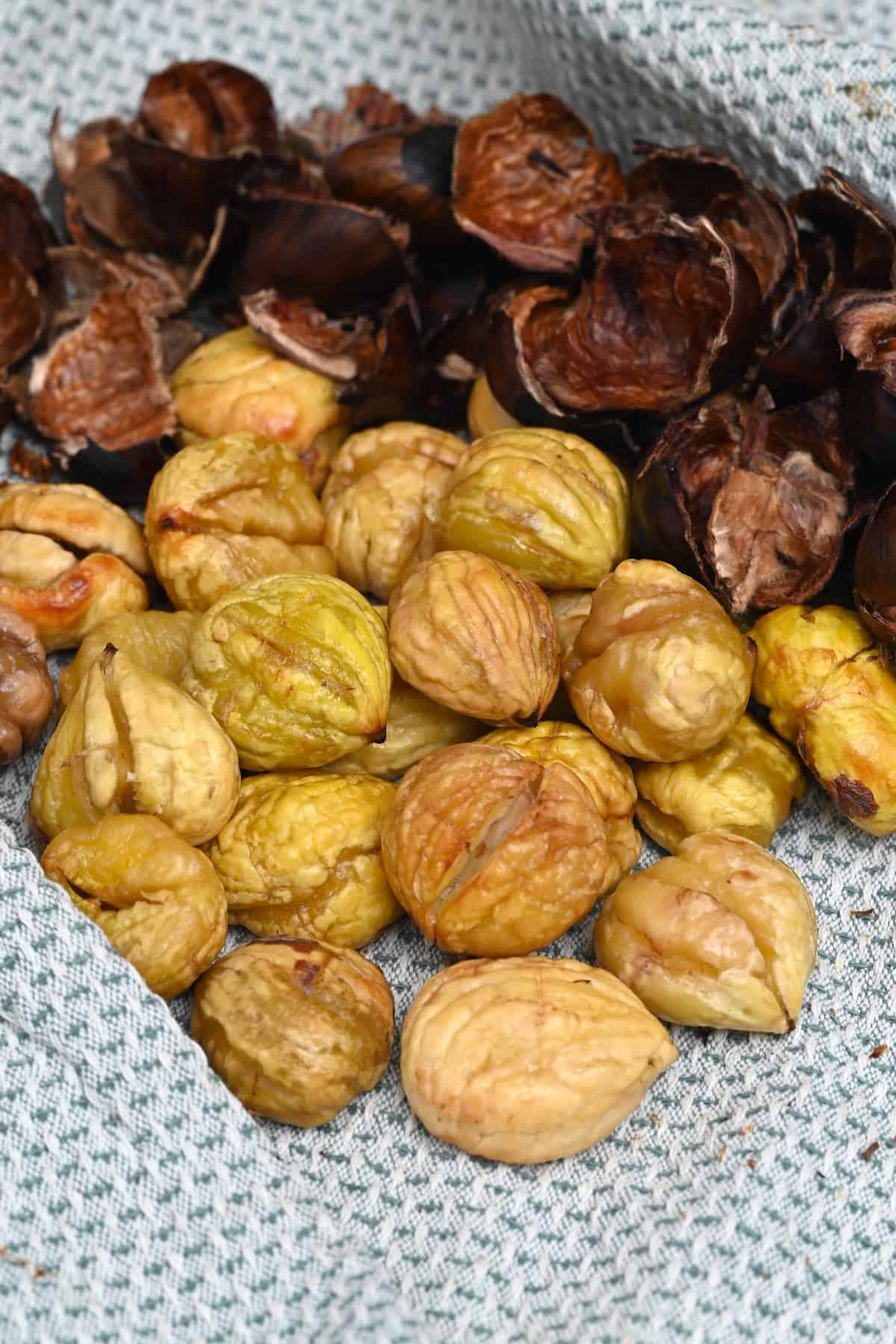
Plus, you can enjoy the roasted, peeled chestnuts alone or even toss them with butter and seasonings to add even more flavor to this simple festive treat, to enjoy all holiday season!
How to Buy Good Chestnuts and Store Them
When selecting chestnuts, ensure they are heavy for their size, shiny, and firm all the way around, avoiding any that rattle or have obvious air pockets between the shell and nut. Look for damage-free shells, too, as tiny pinholes can mean worms are inside.
If you’re foraging for chestnuts, ensure you only choose sweet chestnuts and not horse chestnuts (conkers), as the latter is poisonous for human consumption.
To tell them apart, sweet chestnut shells are covered all over in very thin, almost brush-like spikes. In comparison, horse chestnuts have just a few more pronounced spikes/ bumps on their skin. The shape also differs, with edible chestnuts containing a tassel/point, whereas horse chestnuts are rounded and smooth.
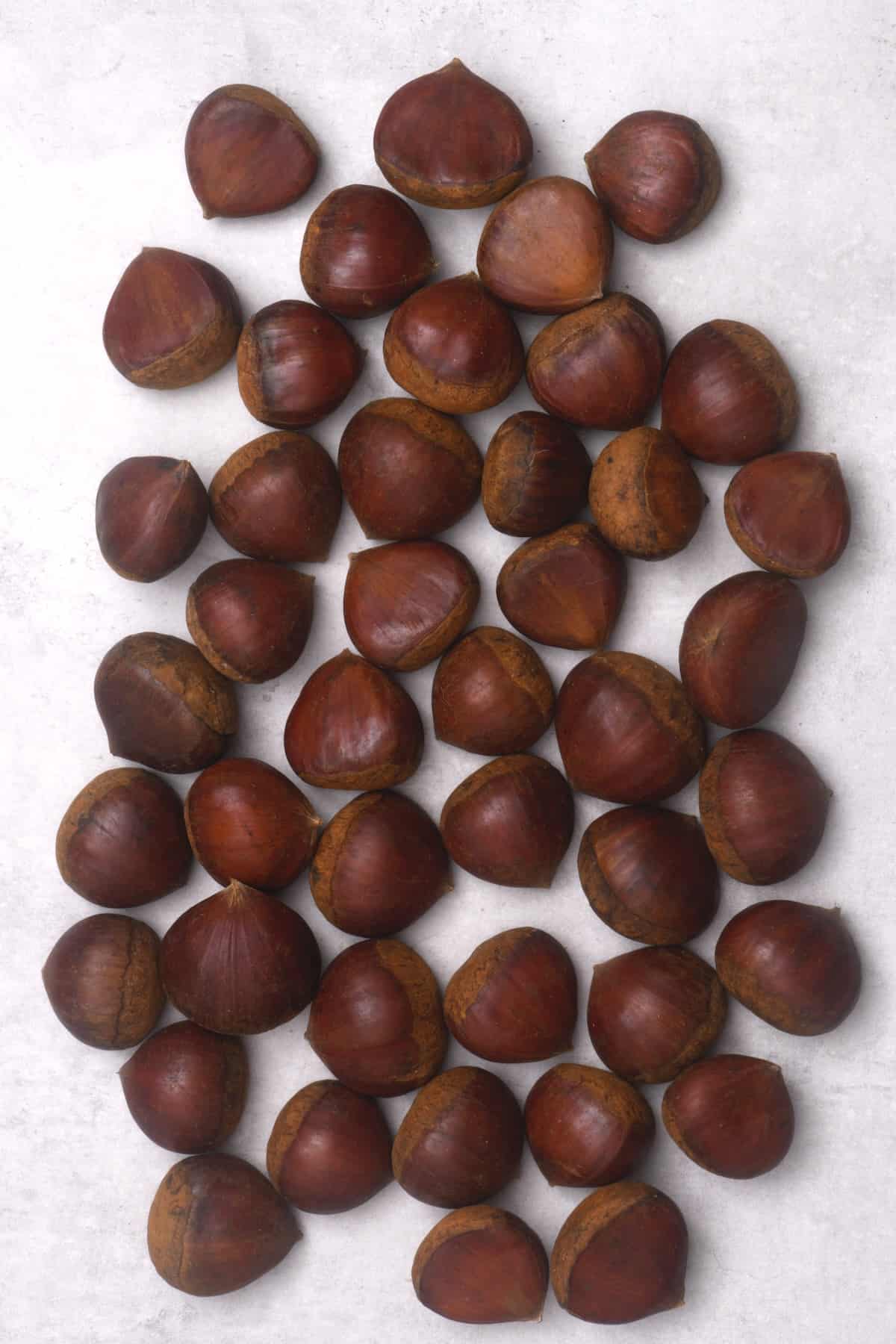
How to Store Chestnuts
Chestnuts spoil fairly quickly, so it’s best to roast them within a few days of buying them. Until then, store them in the crisper drawer in the fridge. Keep them for 3-4 days in a paper bag or for 7-10 days in an airtight container. Remove them from the fridge a day before roasting them for the best results and flavor.
Store the fresh, scored chestnuts in a Ziplock bag with excess air removed for up to 6 months in the freezer.
How to Roast Chestnuts in the Oven
Roasting chestnuts in oven is fairly quick and simple, requiring just a few steps.
How to Prepare Chestnuts Before Roasting
First, preheat the oven to 425ºF/220ºC.
Then, wash the chestnuts well and pat them dry.
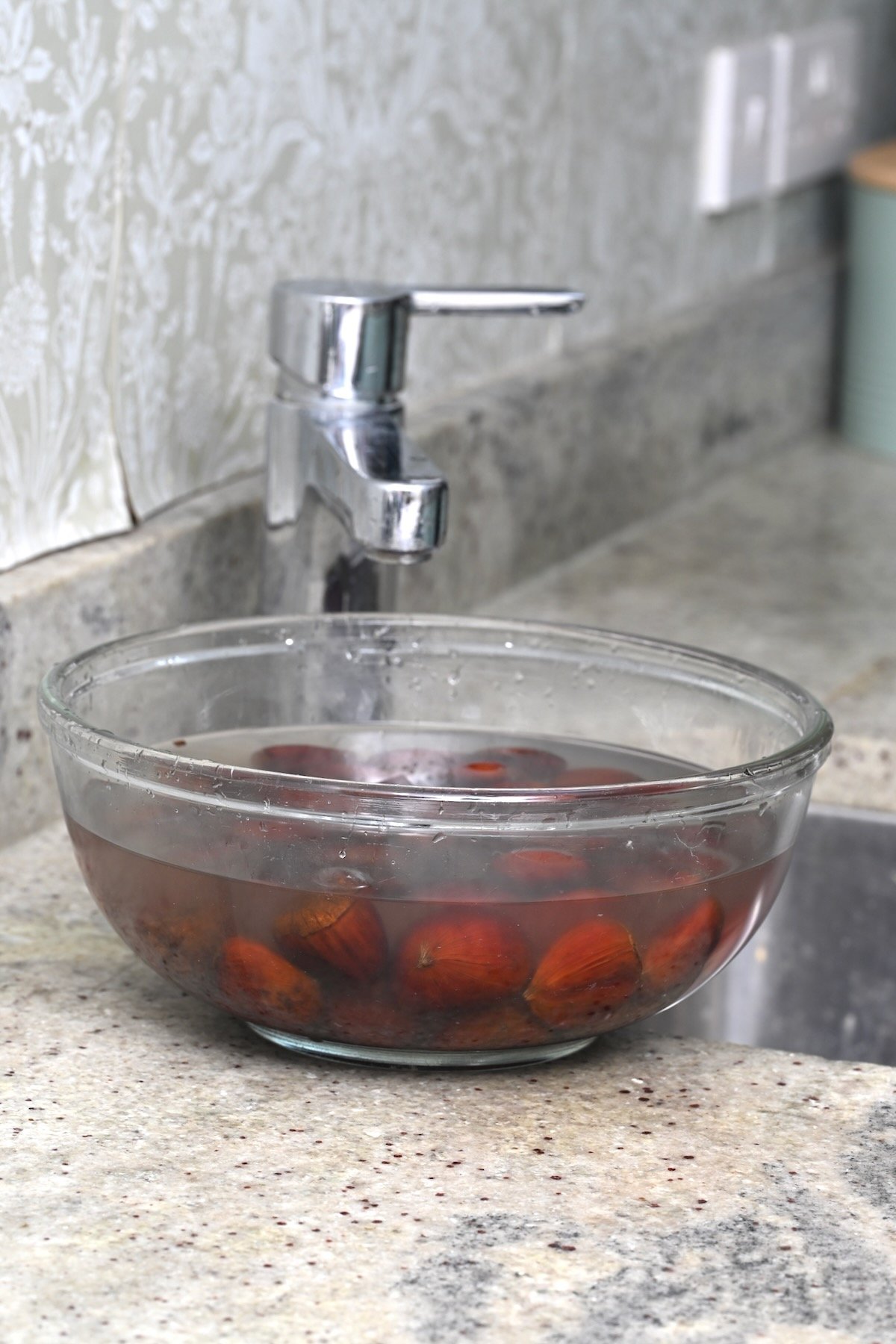
Place a chestnut, one at a time, on your cutting board, flat-side down. Then, use a sharp knife (serrated is best, though a sharp paring knife should also work) to carefully score an X (about 1/2-inch big) shaped slit onto the rounded side of the chestnut. Try cutting through the outer shell, but not the nut itself.
Continue scoring the round side of each chestnut, then transfer them to a large foil-lined baking sheet or an oven-safe dish.
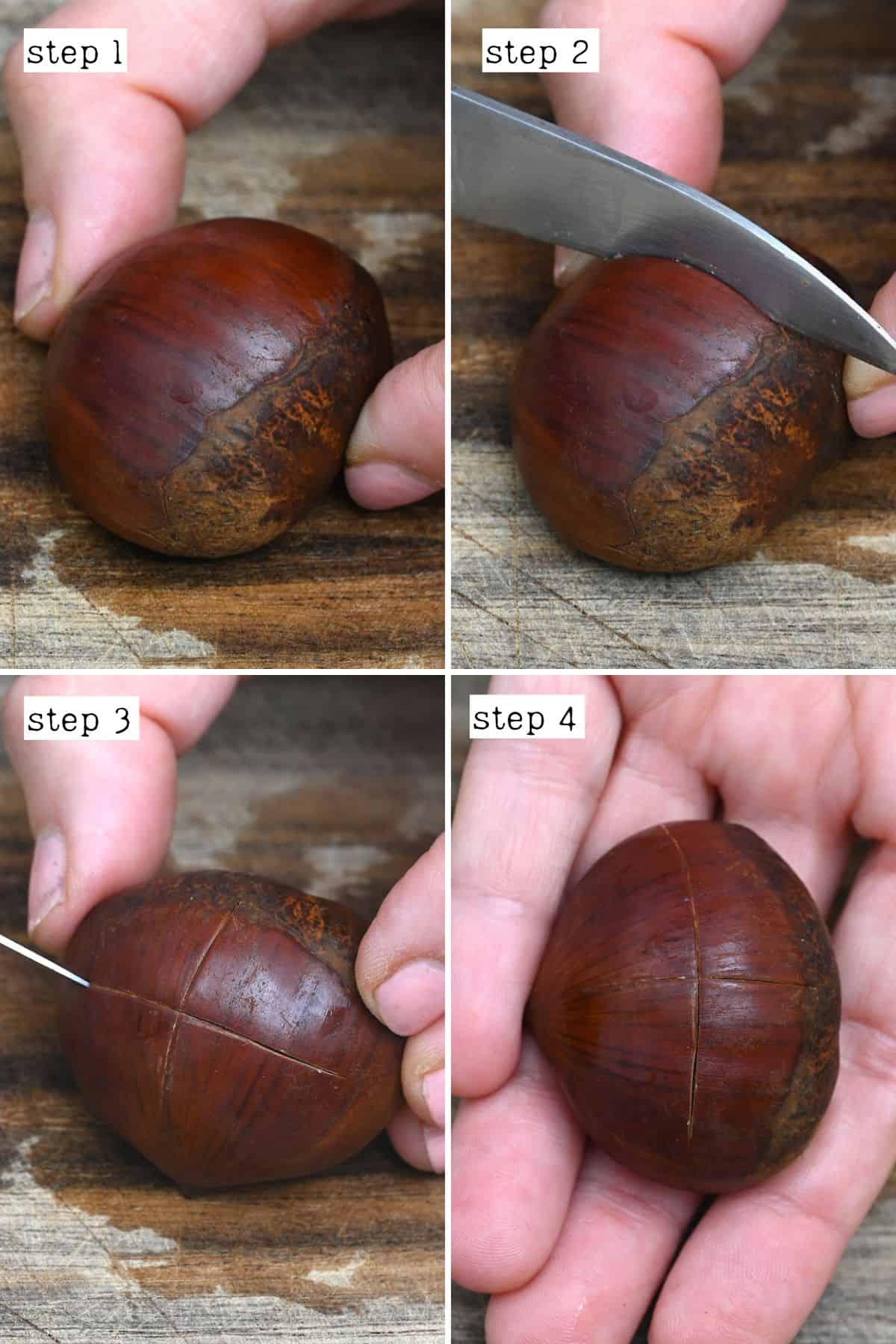
How Long Do You Roast Chestnuts in the Oven
Place chestnuts on a baking rack with the flat side down in a single layer. Cook chestnuts in the oven at 425ºF/220ºC for between 20-25 minutes (or up to 35 minutes for very large chestnuts) until the shell peels back and the flesh is tender.
And this is how to bake chestnuts.
The exact time to roast the chestnuts will vary based on their size, so first check on them at 10-20 minutes.
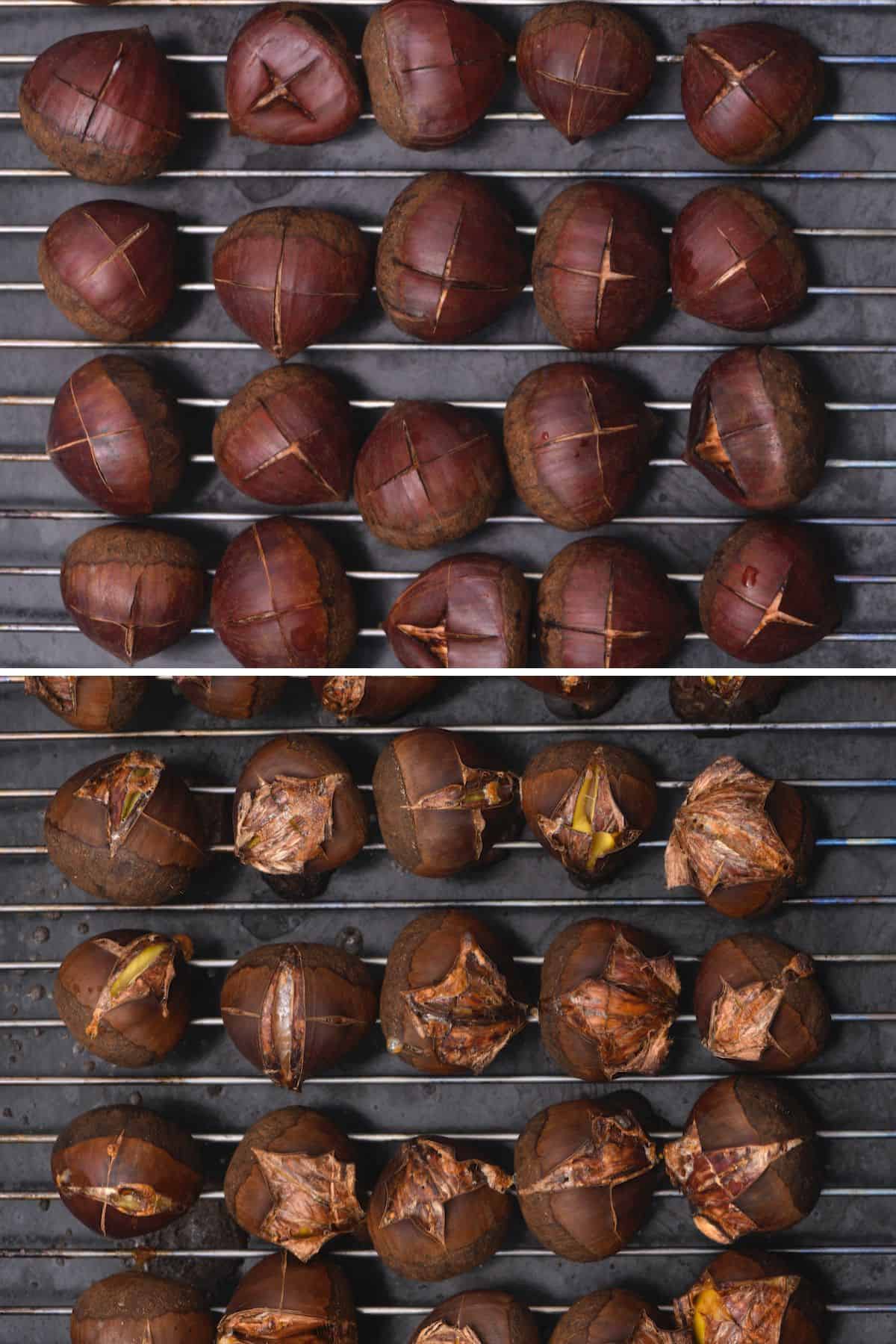
How to Peel Chestnuts Easily
Once you’ve removed the chestnuts from the heat source, place a kitchen towel over the pan and allow them to rest until they’re just cool enough to handle (about 10-15 minutes). This will gently steam them, making them even easier to peel.
In the end, squeeze the nuts in the tea towel to help crack some skins.
If the nuts are still very hot, use a kitchen towel while peeling them back from the scored X. Remove the hard outer shell and the papery skin between the shell and the nut.
Unfortunately, sometimes you’ll only be able to tell if a chestnut has gone bad after peeling it. If you notice any signs of mold, like gooey flesh, black spots, or mold, discard them.
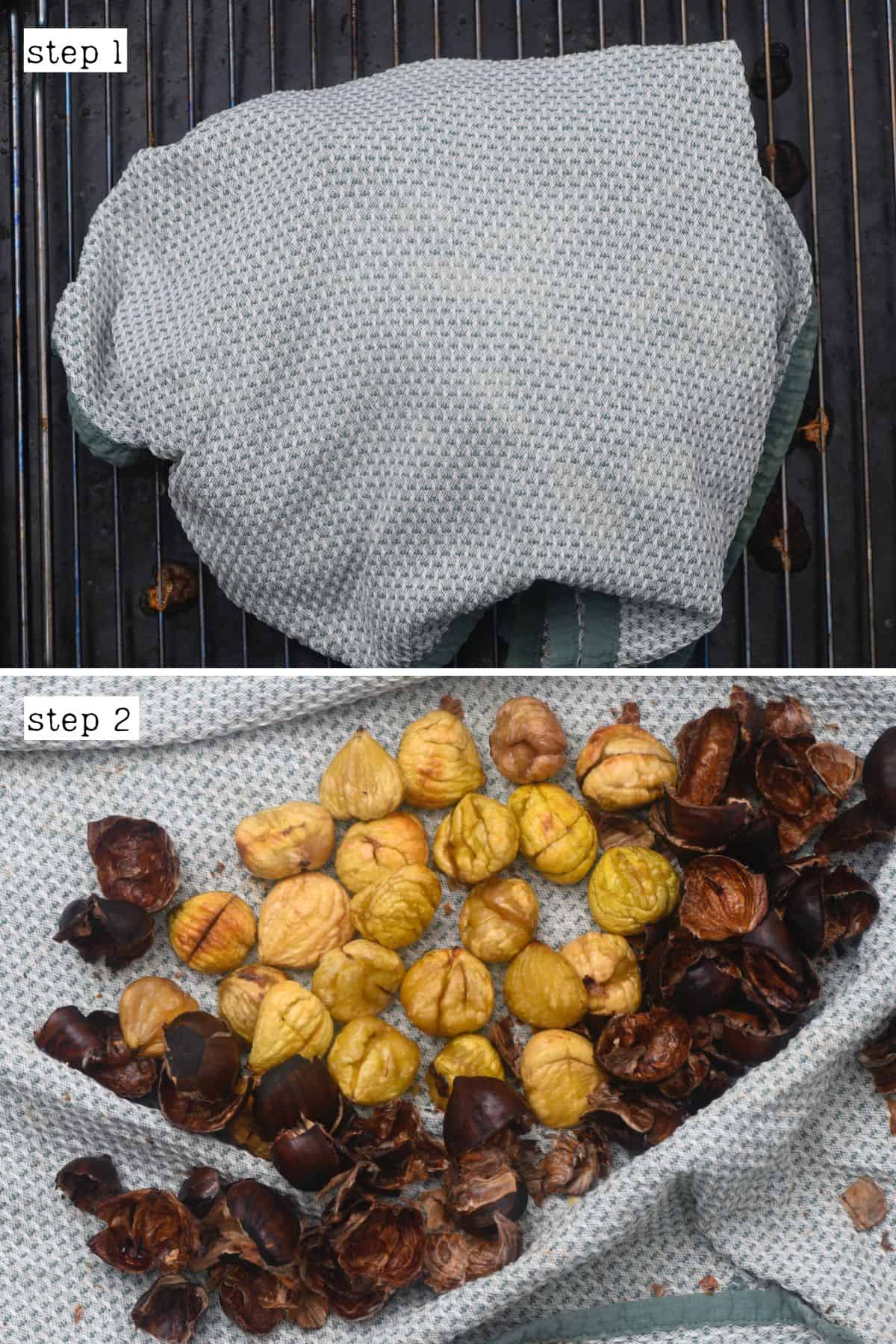
How to Store Peeled Chestnuts
Once cooled, store leftovers in an airtight container in the fridge for up to 4 days, but they are best on days 1 and 2.
Or allow the cooked chestnuts to cool and transfer them to a freezer-safe Ziplock bag. Use a straw to suck out as much excess air as possible and seal. Then store for up to 3 months. Leave them to thaw in the fridge overnight before reheating.
What to Do with Roasted Chestnuts
My favorite way to enjoy these oven-roasted chestnuts is as a simple holiday snack. You can enjoy them alone, toss them with butter and optionally some salt, or even season them with complimentary spices, like:
- Cinnamon sugar – alternatively, mix this with melted butter to create a drizzle/sauce,
- Ginger,
- Nutmeg,
- Allspice,
- Salt & rosemary,
- Salt & thyme.
You could also use baked chestnuts in other recipes. For example, chop them to add to salads, stir-fries, and risotto, mix them into stuffing, enjoy chestnut soup, or turn them into chestnut puree to add to sauces and desserts. What are your favorite ways how to eat roasted chestnuts?
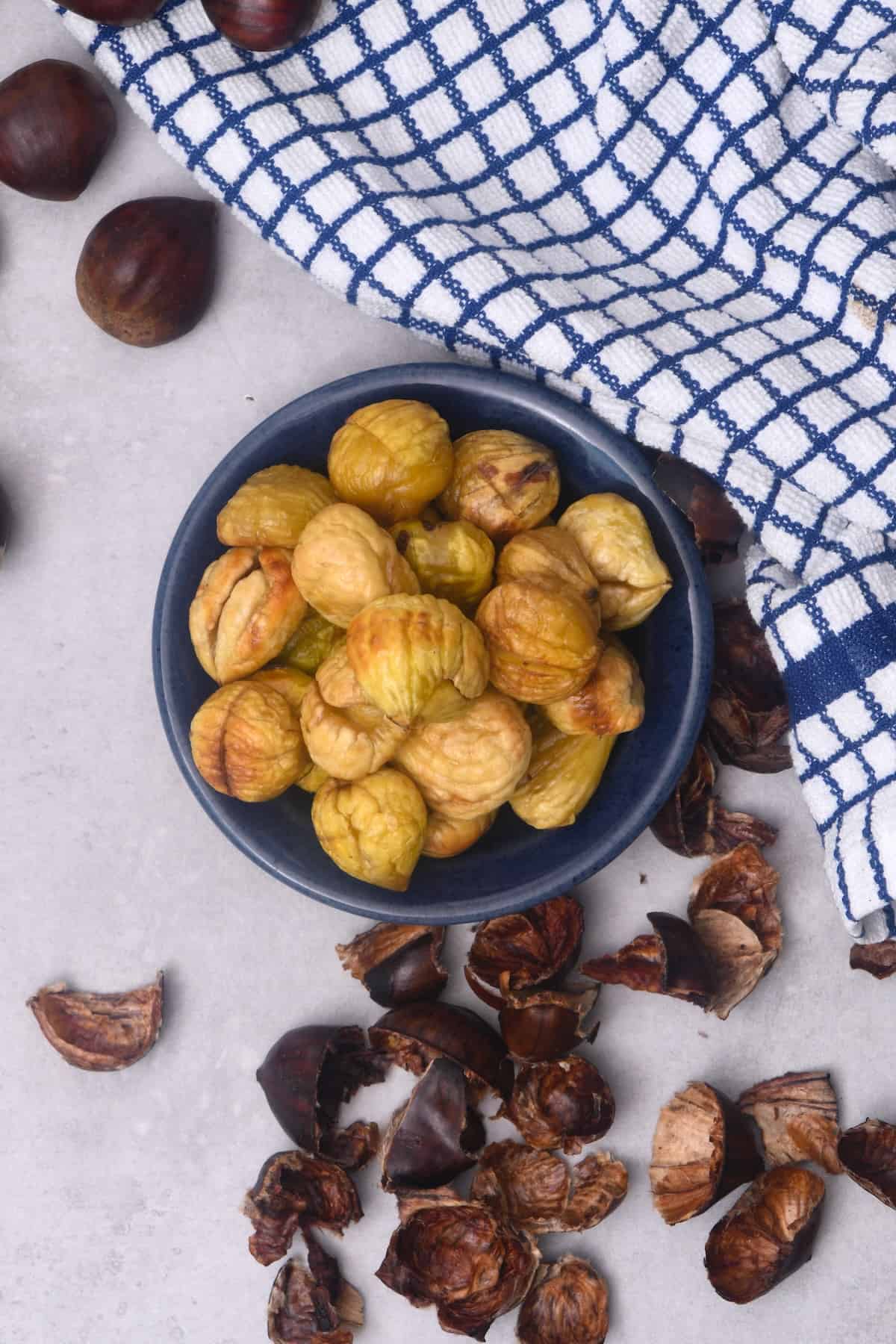
FAQs
If you make the X too small when roasting chestnuts, it can make them harder to peel. You should also peel them when they’re just cool enough to handle. The more they cool, the harder they’ll be to peel.
Different varieties will peel easier, too. I.e., Italian or Turkish chestnuts are easier to peel than Chinese ones.
There’s no need to soak chestnuts before chestnut roasting, though it may make them easier to peel and slightly softer once roasted. However, I haven’t found enough difference to warrant adding the extra time to the method.
If you want to try, score the nuts, then leave them to soak for at least 1 hour and up to 24 hours. Or soak them in boiled water for just 10 minutes.
If any nuts remain floating throughout, discard them, as they’re rotten inside.
Boiling the chestnuts also tends to help with peeling them. Yet, I rarely take the extra time to do this step.
If you want to give this a try, first score the chestnuts. Then boil them for 5 minutes in water with 2 Tbsp oil (they won’t taste oily afterward). Then drain and put in the oven to roast for about 20 minutes.
This usually happens if you don’t score the nuts when baking chestnuts. Scoring the nuts is essential as the liquid in the nuts turns to steam while they cook and builds up pressure within the nut if there’s no way for it to release.
Chestnuts are low in fat (unlike most nuts), low GI, and contain several beneficial properties. These include containing several beneficial flavonoids, polyphenols, and antioxidants. They’re also an excellent source of vitamin B, vitamin C, copper, manganese, folate, potassium, etc.
More Christmas Recipes
If you try this easy best roasted chestnut recipe, let me know how it goes in the comments below. I’d appreciate a recipe card rating and would love to see your recipe recreations – tag me on Instagram @Alphafoodie!
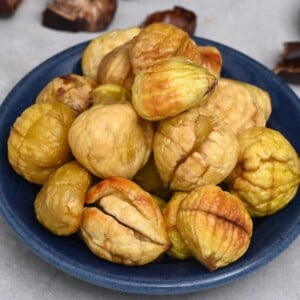
How to Roast Chestnuts in the Oven & Easy Peel Method
Ingredients
- 24 oz chestnuts about 4 cups
Instructions
Prepare the Chestnuts
- Preheat the oven to 425ºF/220ºC.
- Wash the chestnuts well and pat them dry.
- Place a chestnut, one at a time, on your cutting board, flat-side down. Use a sharp knife (serrated is best, though a sharp paring knife should also work) to carefully score an X (about 1/2-inch big) shaped slit onto the rounded side of the chestnut. Try cutting through the outer shell, but not the nut itself.Continue scoring the remaining chestnuts, then transfer them to a large foil-lined baking sheet or an oven-safe dish.To make them easier to peel, you can soak the nuts in water or even par-boil them in water with oil – check the FAQs for these tips!
Roast Chestnuts in the Oven
- Transfer the chestnuts to a baking rack or a baking tray with the flat side down. Bake them in the oven at 425ºF/220ºC. for between 20-25 minutes (or up to 35 minutes for very large chestnuts) until the shell peels back and the flesh inside is tender.The exact time to roast the chestnuts will vary based on their size, so first check on them at 10-20 minutes.
Peel the Chestnuts
- Once you've removed the chestnuts from the heat source, place a kitchen towel over the pan and allow them to rest until they’re just cool enough to handle (about 10-15 minutes). This will gently steam them, making them even easier to peel.
- In the end, squeeze the nuts in the tea towel to help crack some skins.If the nuts are still very hot, use a kitchen towel while peeling them back from the scored X. Remove the hard outer shell and the papery skin between the shell and the nut.Unfortunately, sometimes you’ll only be able to tell if a chestnut has gone bad after peeling it. If you notice any signs of mold, like gooey flesh, black spots, or mold, discard them.
Storage Instructions
- Fridge: Once cooled, store leftovers in an airtight container in the fridge for up to 4 days, but they are best on days 1 and 2. Freezer: Allow the cooked chestnuts to cool and transfer them to a freezer-safe Ziplock bag. Use a straw to suck out as much excess air as possible, seal, and store for up to 3 months. Leave them to thaw in the fridge overnight before reheating.Reheat: reheat roasted peeled chestnuts on the stove over low heat with a bit of butter. Alternatively, microwave them in 30-second increments with a splash of water until warmed through. Large amounts can go back in the oven at 300ºF/150ºC until heated through (10-15 minutes).Be careful not to overcook them when reheating; otherwise, they'll become dry and hard. Always add a little liquid when microwaving, as they can catch on fire if they're too dry.
Video
Notes
- Small chestnuts can take between 4-6 minutes.
- Medium chestnuts will take around 10 minutes.
- Large chestnuts may take up to 16 minutes.
Nutrition
Nutrition information is automatically calculated, so should only be used as an approximation.
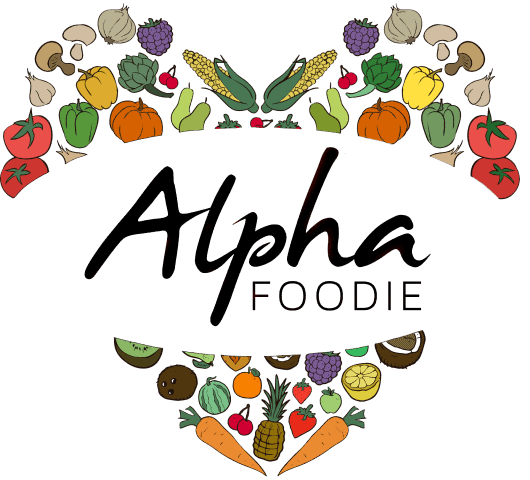




















Many thanks, I found the answers to all my questions! I didn’t know that they needed to be stored in the refrigerator, they just dry out when stored in the kitchen and explode all the time when frying, I will make an X cut!
Thanks for your comment, Anastasia. I am glad this was helpful 🙂
Helpfull information about roasting chestnuts
Thank you for your comment!
Hi Samira
I have bought a tin of chestnuts from my Asian store as here in South Africa it is not something you will get in the supper marker. I have no idea what to do with it and i am curious to taste these chestnuts.
thanks
Hi Geraldine,
You can add them to stir-fries, soups, or even salads. Or you can enjoy them as a snack. Depending on what type of chestnuts they are, you can even eat them raw (check the information on the tip). I hope this helps.